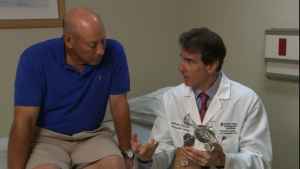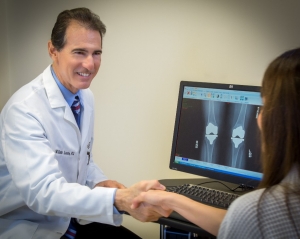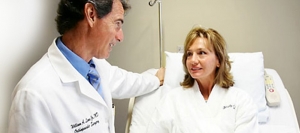I had My Hip or Knee Replacement and I’m Still in Pain. Now What? When Is It Time For a Second Opinion?
When should someone who already has had a hip or knee replacement and who is not satisfied with the results seek a second opinion? In my experience, it is healthy and honest to seek another opinion if the result after surgery is not acceptable to you. If you think you need one or would simply feel better with one, get one.
 There are many reasons someone may not be happy after their surgery. It could be a problem with your surgery, an infection, or unrealistic expectations. Having your history, exam and X-rays reviewed by someone who did not do your surgery can often reconfirm what you’ve already been told. While this may not be what you want to hear, it can be comforting. This second opinion also may give you new insights and direction on how to improve your situation.
There are many reasons someone may not be happy after their surgery. It could be a problem with your surgery, an infection, or unrealistic expectations. Having your history, exam and X-rays reviewed by someone who did not do your surgery can often reconfirm what you’ve already been told. While this may not be what you want to hear, it can be comforting. This second opinion also may give you new insights and direction on how to improve your situation.
I typically do not encourage a very early post-operative second opinion. I think it’s better to give your tissues time to heal and your body time to rehabilitate. A second opinion may be appropriate if you’re concerned your tissues aren’t healing and you’re not seeing progress with your rehab, or if you’re getting worse with time. An early second opinion may be appropriate if a complication occurred during or soon after your surgery, such as a fracture or infection, and you feel you need confirmation that further surgery or treatments recommended by your surgeon are warranted. Sadly, complications can happen after surgery and if you remain confident in your surgeon, don’t feel you must get a second opinion. I always recommend going back to your original treating surgeon first for their thoughts and insights.
When I see someone for a second opinion (it’s often the 6th or 7th opinion) regarding concerns with their hip or knee replacement. I ask if they ever did well after their surgery. If they tell me no or that they seemed to improve for only the first few weeks after surgery and then progressively got worse, I consider this a red flag. This is not the progression that is expected after a hip or knee replacement procedure. I think further study is indicated until the situation is understood.
 Recognize that some individuals simply take longer to heal and rehabilitate than others. But even in this group of individuals, I’d expect to see some positive progression, not a history that they’re getting worse with time. Occasionally, a patient will share with me that while they are better than before their surgery they still limp, need a cane or walker and can’t return to activities that they enjoy. They express frustration because their improvement has plateaued and they’re still not able to be active. For these individuals, I think seeking a further opinion may be appropriate.
Recognize that some individuals simply take longer to heal and rehabilitate than others. But even in this group of individuals, I’d expect to see some positive progression, not a history that they’re getting worse with time. Occasionally, a patient will share with me that while they are better than before their surgery they still limp, need a cane or walker and can’t return to activities that they enjoy. They express frustration because their improvement has plateaued and they’re still not able to be active. For these individuals, I think seeking a further opinion may be appropriate.
Multiple studies have shown that many people who report not being satisfied with their results after a hip or knee replacement may have gone into surgery with unrealistic expectations. At The Leone Center for Orthopedic Care I make it a point to sit with my patients and discuss what their hopes and goals are, and I discuss what is realistic to expect and what is not.
For example, I explain to my patients who need a total knee that while some people are able to fully flex their knees so their heel touches their butt, most people cannot. Flexion to 120º is more realistic and the amount of flexion a particular patient achieves post-operatively is most often related to how much knee motion they had before their surgery. We also have a frank discussion about how much knee flexion one already needs to get up and down from a low seat or ride a bike. I also discuss with them how I will realign their leg so it looks straight, but actually how this may make the other leg feel shorter if the other side has not yet been reconstructed and has an angular deformity.
 I discuss with my patients who need a total hip replacement that while most patients can easily cross one leg over the other, like when you’re tying your shoes, some patients struggle or still assist that leg with their arms. Our discussion always includes whether they perceive one leg longer or shorter than the other. I find out how long they’ve felt one leg was longer or shorter or if they’ve been told one leg is longer or shorter but “truth be told” they don’t actually feel any difference. I also learn if they’ve modified a shoe or added an insert to address any leg length inequality. I explain that many people don’t have equal leg lengths before their hip surgery, even though most don’t perceive any difference.
I discuss with my patients who need a total hip replacement that while most patients can easily cross one leg over the other, like when you’re tying your shoes, some patients struggle or still assist that leg with their arms. Our discussion always includes whether they perceive one leg longer or shorter than the other. I find out how long they’ve felt one leg was longer or shorter or if they’ve been told one leg is longer or shorter but “truth be told” they don’t actually feel any difference. I also learn if they’ve modified a shoe or added an insert to address any leg length inequality. I explain that many people don’t have equal leg lengths before their hip surgery, even though most don’t perceive any difference.
One of my goals when performing their surgery is for both legs to feel perfectly equal but that no one can promise that. I explain it’s critical that I understand what they think pre-operatively so I can more accurately create equal leg lengths post operatively to accomplish this goal. We have a healthy discussion so they go into surgery feeling informed and with realistic expectations and goals.
We discuss achievable and realistic goals, like not having pain, getting up and down from a seated position without struggling, or off the floor, being able to enjoy playing, golf, tennis, dancing, hiking, or diving. While it’s true that some people do challenging activities after their hip or knee replacement, like running iron man competitions or jumping out of airplanes, these are neither smart nor doable for most people who have a hip or knee replacement. The reality is that for most people who have had a TKR and THR, while the joint itself no longer holds you back, other body parts and hopefully good judgement may.
So if you’re not satisfied with your result after your hip or knee replacement and your surgeon has told you it’s a good as it gets, I do think another opinion is appropriate and possibly therapeutic. The next surgeon may tell you the same thing which is confirming and good for “peace of mind.” They also may find something else to consider and give you direction how to possibly improve.
So if you do decide to get a second opinion, how do you go about getting a good one? Do your research. Talk to neighbors or friends who had a hip or knee replacement with a good experience and are pleased with their results. If you go online and read about your condition, your symptoms and possible treatments, remember, what’s online is unverified. There is very good information and there is misinformation. You can also look for other specialists who might be able to help you. Share your frustrations with your surgeon. Discuss your concerns and ask if they can they recommend someone else for a second opinion. Make it collaborative rather than confrontational, to find a way forward so you can feel better.
As a surgeon if a patient asks me to help them get a second opinion in regard to their care, I embrace the opportunity. I’m confident enough in myself that if they see another “pro” they will agree with my assessment or possibly come up with another thought or strategy. Personally, it makes me more confident that when my patient returns to me after the second opinion, they know in their own heart they’ve done due diligence and they’re getting the best treatment. The key is seeing someone who is really a “pro.” This may require traveling, possibly to a larger city where there are more specialists. I think it’s preferable to see someone who specializes in hip or knee replacements. And if you already have a hip or knee replacement that is not doing well, seeing a surgeon who specializes in revision total hip or total knee surgery is optimal.
If you are going to get a second opinion, how do you get the most out of it? Go prepared. Collect the pertinent parts of your medical record. When a patient shows up with a “wheel barrow full” of their medical record and a convoluted poorly explained history I feel overwhelmed and frustrated because I’ve got to sort through it all looking for specific data.
- Summarize your history and write it down. Include your primary diagnosis. Include any prior history only if it’s truly relevant. For example, being born with a dysplastic hip, tearing your ACL tear with ligamentous reconstruction prior to your TKR or developing infection or experienced prolonged incisional drainage after their first surgery.
- Write down your symptoms and concerns.
- Include the name of the surgeon, hospital and city where your primary THR or TKR was performed and any other surgeries before or after performed on that hip or knee.
- Implant record and operative notes are critical information. If several surgeries were done, try and get this information for each.
- Bring a copy of your first post-op film, not just a Radiologist report. Typically an X-ray of your hip or knee is taken in the recovery room right after your surgery. The surgeon typically has an X-ray taken in their office 4-6 weeks after your surgery. These very early post-op films are vitally important to compare to later X-rays looking for change.
- Bring recent imaging studies and their reports, i.e. bone scans or MARs MRI.
- Bring recent labs. I would be specifically looking for signs of infection (ESR, CRP) and metal levels if corrosion and an abnormal local tissue response (ALTR) is a concern (serum Cobalt and Chromium levels)
- Report if your hip or knee was aspirated and if so bring the laboratory results. Also, report if you had cortisone injections into or around the prosthetic joint and when.
Sometimes a second opinion is appropriate. Always go back to your treating surgeon first and enlist their help. If you do see other surgeons for second opinions, see a “pro” and go prepared.
For a recent blog on understanding what could be the cause of pain from your already operated hip replacement click here.
Dr. William A. Leone is head of the Leone Center for Orthopedic Care at Holy Cross Hospital in Fort Lauderdale, Florida and has earned a reputation as one of the nation’s top orthopedic surgeons. An orthopedic surgeon with extensive experience, his specialty is solving complex hip and knee problems. Call 954-489-4575 or email us to schedule a consultation.





